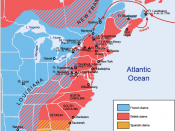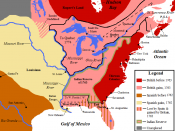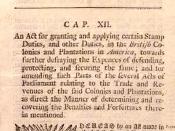1.What were the consequences of the French and Indian War?-casualties were high, food was in short supply, & there was much inflation-Britain faced an enormous debt-needed to finance an extremely large army-borrowed money-won colonial support by promising that Britain would pay up to half of their costs for fighting in the war --> all of these things led to huge debt-Treaty of Paris concluded in the war in 1763-France surrendered almost all of Canada to Britain and gave New Orleans and all of its territory west of the Mississippi to Spain2.What is the significance of PontiacÃÂs Rebellion?-Indians thought that their new allies, the British, were going to take place of the French-the British did not exercise diplomacy in the form of middle ground like the French had done previously-conflict that goes on for about a year-when the French-Indian War --> British left a standing army in North America-colonists looked at with great suspicion-should not have a standing army in peace time â colonists believed that Parliament was out to deceive them3.
What legislation did Parliament pass from 1763 to 1765 and how was this legislation received in British-America?-the British Parliament passed the Proclamation of 1763 --> purpose was to keep the settlers and speculators away from the Indians-confined the colonists to the east of the Alleghenies-Currency Act (1764)-Sugar Act (1764) â English figured that the colonists would be happy because they will be getting a better deal àcolonists do not like this because they do not want Parliament telling them what they can and cannot do-writs of assistance àcustoms agents sent patrol ships â blank search warrants (gives them the right to check ships and warehouses to see if goods have been smuggled in)-colonists not happy with this-Stamp Act (1765)-a whole variety of items --> any legal document, newspapers, liquor, rum, playing cards-colonist pretty unhappy with the stamp act (was not an external tax --> was an internal tax)-they donÃÂt believe that Parliament has a right to do this --> ÃÂno taxation without representationÃÂ-English Bill of Rights (believed that they had the basic rights of English citizens) -->free gift of the people given by or decided by local assemblies-did not have representation of Parliament --> Parliament that does not have the right to issue such a tax-organized urban riots against British authority-one of the basic things that does happen --> crowds begin to well-organized riot (extralegal authority)-community deciding what is right and what is wrong





